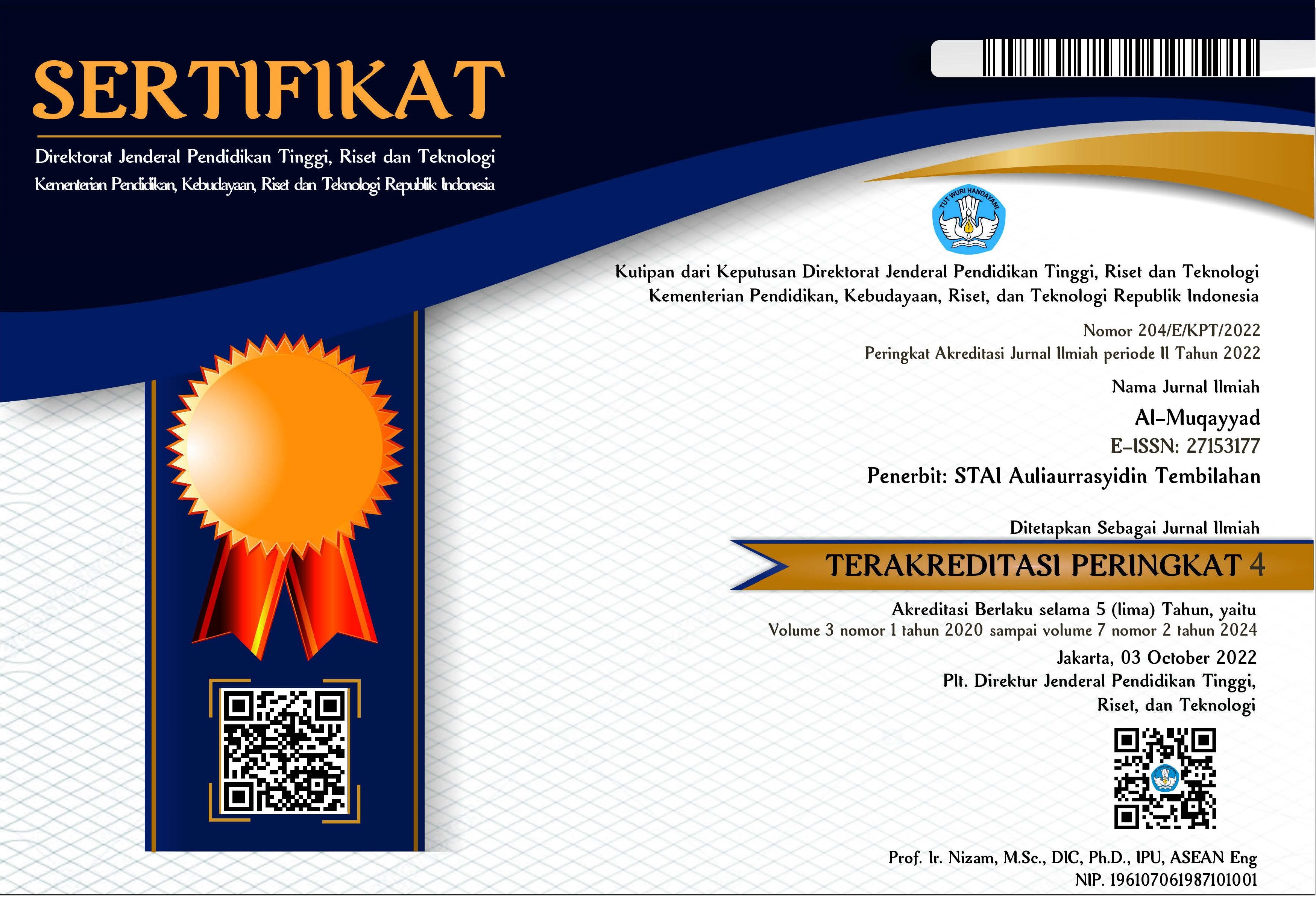Kebijakan Fiskal pada Masa Rasulullah dan Sekarang
DOI:
https://doi.org/10.46963/jam.v3i2.283Keywords:
Fiscal policy, Rasulullah, NowadaysAbstract
This study aimed at distinguishing fiscal policy during the time of the Prophet and the fiscal policy prevailing in Indonesia. The study method in this research is literature study. The type of data used is secondary data with data collection methods through literature study. The results showed that during the time of the Prophet, the first fiscal policy that was taken after moving to Medina was to make muhajirin and ansar fraternal and provide employment for the Muhajirin. In the second year, almsgiving and fitrah are compulsory, followed by zakat in the ninth year of hijriyah. From here emerged fiscal policy instruments derived from zakat, infaq, alms and waqf. Some of these elements are mandatory and some are voluntary. Zakat is an element that must be paid after reaching the nisab, while infaq, alms and waqf are voluntary. This voluntary element is what distinguishes an Islamic economy from a capitalist economy. Another difference between the two is related to the management of state money where part of the APBN sources obtained from debt must be free from the element of interest, thus, the state debt can actually be obtained in ways that are in accordance with Islamic Sharia
Downloads
References
Al Arif, M. N. R. (2015). Pengantar Ekonomi Syariah. Bandung: Pustaka Setia.
Alavi, S. E., Moshiri, S., & Sattarifar, M. (January 01, 2016). An Analysis of the Efficiency of the Monetary and Fiscal Policies in Iran Economy Using IS - MP - AS Model. Procedia Economics and Finance, 36, 522-531.
Boedi, A. (2011). Peradaban Pemikiran Ekonomi Islam. Bandung: Pustaka Setia.
Fathurrahman, A. (2012). Kebijakan Fiskal Indonesia dalam Perspektif Ekonomi Islam: Studi Kasus Dalam Mengentaskan Kemiskinan. Jurnal Ekonomi dan Studi Pembangunan, 13(1), 72-82.
Gampito. (2020). Pemikiran kebijakan fiskal ekonomi Islam. Jurnal Ilmiah Syariah, 9(1), 32-46. http://dx.doi.org/10.31958/juris.v9i1.736
Gootjes, B., & de, H. J. (2020). Procyclicality of fiscal policy in European Union Countries. Journal of International Money and Finance. https://doi.org/10.1016/j.jimonfin.2020.102276.
Habibah, Aminah Nur, Ghafur, Ruslan Abdul, Anggraeni, Erike, & Malik, Anas. (2020). Peran Kebijakan Fiskal Islam Dalam Mengentas Kemiskinan Melalui Program Keluarga Harapan. STIE AAS Surakarta.
Haryanto, J. T. (December 30, 2016). Tinjauan Teoritis Kebijakan Fiskal Islam Periode Nabi Muhammad SAW. Alqalam, 33(2), 122.
Janwari, Y. (2016). Pemikiran Ekonomi Islam. Bandung: Remaja Rosdakarya.
Kementerian Agama. (2010). Al-Quran Terjemah dan Tafsir Perkata. Bandung: Pondok Yatim Al-Hilal.
Rahardjo, M. D. (2001). Sejarah Pemikiran Ekonomi Islam. Jakarta: The International Institute of Islamic Thougt.
Rahmawati, L. (2016). Sistem Kebijakan Fiskal Modern dan Islam. OECONOMICUS Journal of Economics, 1(1), 21-48. https://doi.org/10.15642/oje.2016.1.1.21-48
Rozalida. (2014). Ekonomi Islam Teori Dan Aplikasinya Pada Aktivitas Ekonomi. Jakarta: Rajawali Pers.
Sari, N. (2017). Zakat Sebagai Kebijakan Fiskal Pada Masa Kekhalifah Umar Bin Khattab. Jurnal Perspektif Ekonomi Darussalam, 1(2), 172–184. https://doi.org/10.24815/jped.v1i2.6552
Setyaningrum, A. (2013). Desentralisasi Fiskal Kontemporer Dalam Perspektif Kebijakan Publik Islam. Ekonomika-Bisnis, 4(1), 1-12.
Winiardi, A. M., Arafah. S. (2020) Analisis Kebijakan Fiskal Islam Muhammad Abdul Mannan. Jurnal Mahasiswa Fakultas Ekonomi dan Bisnis, 1(1), 443-454.
Downloads
Published
How to Cite
Issue
Section
License
Authors who publish with this journal agree to the following terms:
1. Copyright on any article is retained by the author(s).
2. The author grants the journal, right of first publication with the work simultaneously licensed under a Creative Commons Attribution shareAlike 4.0 International License that allows others to share the work with an acknowledgment of the work’s authorship and initial publication in this journal.
3. Authors are able to enter into separate, additional contractual arrangements for the non-exclusive distribution of the journal’s published version of the work (e.g., post it to an institutional repository or publish it in a book), with an acknowledgment of its initial publication in this journal.
4. Authors are permitted and encouraged to post their work online (e.g., in institutional repositories or on their website) prior to and during the submission process, as it can lead to productive exchanges, as well as earlier and greater citation of published work.
5. The article and any associated published material is distributed under the Creative Commons Attribution-ShareAlike 4.0 International License





2.png)



